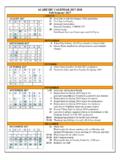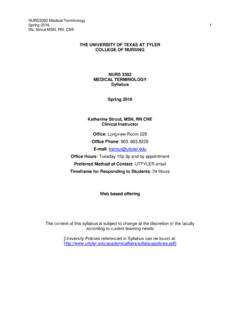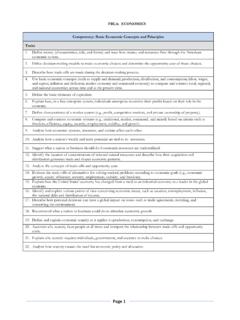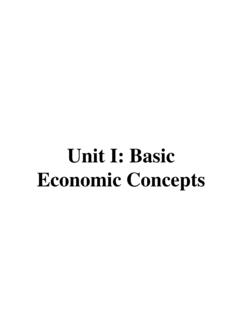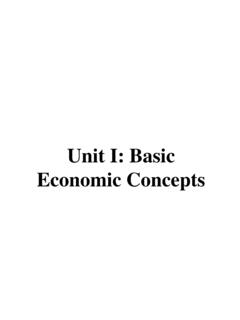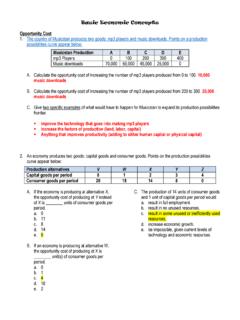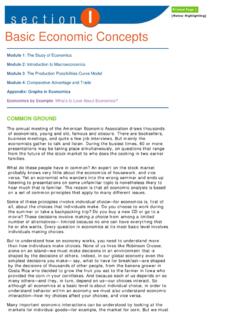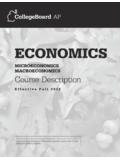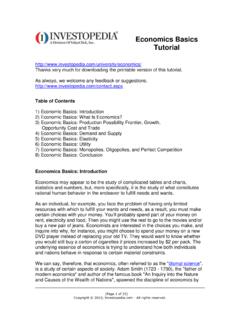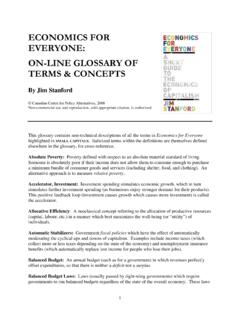Transcription of Framework for Teaching Basic Economic Concepts with …
1 2 Chapter II n t ro d u c t i o nThis publication is an updated and edited merger of two previous National Council onEconomic Education documents: A Framework for Teaching the Basic ConceptsandEconomics: What and When. The combined publication is designed to aid those whoconstruct curricula or who provide economics instruction in the nation s elementaryand secondary schools. Our purpose is to present a concisely stated set of Basic con-cepts for Teaching economics below the college level and a set of guidelines to enableschools to develop a systematic program of studies from kindergarten through twelfthgrade.
2 Today s students will face an increasing variety of important Economic deci-sions in their personal lives and as citizens in a democratic society. Our goal is toenable students, by the time they graduate from high school, to understand enougheconomics to make reasoned judgements about both personal Economic questionsand broader questions of Economic policy in a complex and changing , we want to assist schools in developing Economic education programs inwhich students can acquire the knowledge and skills they need to become.
3 Productive members of the work force Responsible citizens Knowledgeable consumers Prudent savers and investors Effective participants in a global economy Competent decision makers throughout their livesA Brief HistoryThis publication and much of the work of the National Council on EconomicEducation have their roots in the 1961 Report of the National Task Force on EconomicEducation. The task force Reportwas the first systematic effort by distinguished econ-omists and teachers to give direction and shape to Economic education in grades K-12.
4 The Reportpointed to the need for more and improved Economic instruction inelementary and secondary schools, stressed the importance of taking a more system-atic, reasoned approach to the study of Economic problems, outlined what constitutesthe Economic understanding one needs for responsible citizenship, and offered aseries of recommendations for putting the report s conclusions into of the Task Force Report led the then Joint Council on EconomicEducation (JCEE) to develop a process called the Developmental EconomicEducation Program (DEEP).
5 The process is still in action and much i t, the affil iated sta te council and center sta ff member s, using t heE c o n o m i c sAmerica programs, work with school systems to develop curricula for teach-ing Basic Economic understandings every high school graduate should have, deter-3mine how this understanding can best be taught to students, and designate at whichgrade levels specific Economic materials can best be used in the the 1960s, Economic educators and teachers in and out of DEEP contin-ued to develop curriculum materials in economics and to upgrade the capability ofteachers to work with them.
6 By the mid-1970s, persistent efforts of economists, spe-cialists in Economic education ( Economic educators), and teachers to clarify whicheconomic Concepts should be taught and how to teach them most effectively, pro-duced a consensus about what could be accomplished and how it should be consensus embraces the following understanding of Basic Economic Concepts is more important than a heavydose of factual efforts should concentrate on aiding students to achieve a funda-mental understanding of a limited set of Economic Concepts and their should be given a conceptual Framework to help them organize theirunderstanding of economics.
7 And they should be exposed to a manner of think-ing that emphasized systematic, objective real personal and social advantages of Economic understanding becomeapparent as individuals achieve competence in applying their knowledge to awide range of Economic issues they consensus led to the publication of the first edition of the Frameworkin 1977and a major revision in 1984. Economics: What and Whenwas originally published in1989. The change in the name of the Joint Council on Economic Education to theNational Council on Economic Education and the launching of a broad-basedEconomicsAmerica program in 1993 led to a slightly updated reprinting of theFramework, but subsequent experience indicated a need to update and combine theFrameworkand Economics: What and Wheninto a single integrated document.
8 In thechapters that follow, we first present a brief explanation of the Economic conceptsselected for emphasis and then make recommendations for sequencing these con-cepts within the curriculum. These recommendations reflect the commitment of theNational Council on Economic Education and its network of affiliated state councilsand centers to developmental education that is, the systematic introduction anddevelopment of Concepts in simple forms at the lower grade levels, followed byincreasingly sophisticated expositions of the same Concepts as students mature intel-lectually.
9 Recommendations pertaining to the grade placement of Economic conceptsand content are based on a consideration of the structure of the discipline of economics; cognitive development theories and research; current school Reasoned Appro a c hIf the goal of Economic education is to prepare students for effective decision makingand responsible citizenship, individuals must be helped to become intelligent readersof newspaper and news magazines, perceptive watchers of television, careful listen-ers to radio, and critical observers of the political process.
10 Effective Economic deci-sions are more likely to be reached if, in addition to a mastery of Basic Concepts andan appreciation of how the Concepts relate to each other, individuals have an under-standing of the broad social goals that are most often used to evaluate Economic per-formance and policies and an orderly, reasoned approach to Economic decisionmaking. We have included a statement on broad social goals in our explanation ofbasic Economic Concepts in Chapter II. Here we want to emphasize that the mostimportant step toward understanding in economics as in other branches of knowl-4edge is the replacement of emotional judgment by objective, reasoned orderly and reasoned approach to Economic decision making involves the fol-lowing the problem or are the important facts?
